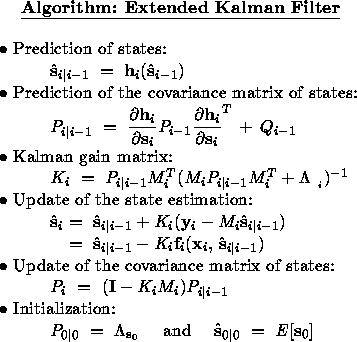If ![]() is not linear or a linear relationship between
is not linear or a linear relationship between
![]() and
and ![]() cannot be written down, the so-called
Extended Kalman Filter (EKF for abbreviation) can be
applied
cannot be written down, the so-called
Extended Kalman Filter (EKF for abbreviation) can be
applied![]() .
.
The EKF approach is to apply the standard Kalman filter (for linear systems) to nonlinear systems with additive white noise by continually updating a linearization around the previous state estimate, starting with an initial guess. In other words, we only consider a linear Taylor approximation of the system function at the previous state estimate and that of the observation function at the corresponding predicted position. This approach gives a simple and efficient algorithm to handle a nonlinear model. However, convergence to a reasonable estimate may not be obtained if the initial guess is poor or if the disturbances are so large that the linearization is inadequate to describe the system.
We expand ![]() into a Taylor series about
into a Taylor series about
![]() :
:
By ignoring the second order terms, we get a linearized measurement equation:
where ![]() is the new measurement vector,
is the new measurement vector, ![]() is the
noise vector of the new measurement, and
is the
noise vector of the new measurement, and ![]() is the linearized
transformation matrix. They are given by
is the linearized
transformation matrix. They are given by

Clearly, we have
![]() , and
, and
![]() .
.
The extended Kalman filter equations are given in
the following algorithm, where the derivative ![]() is computed at
is computed at ![]() .
.
